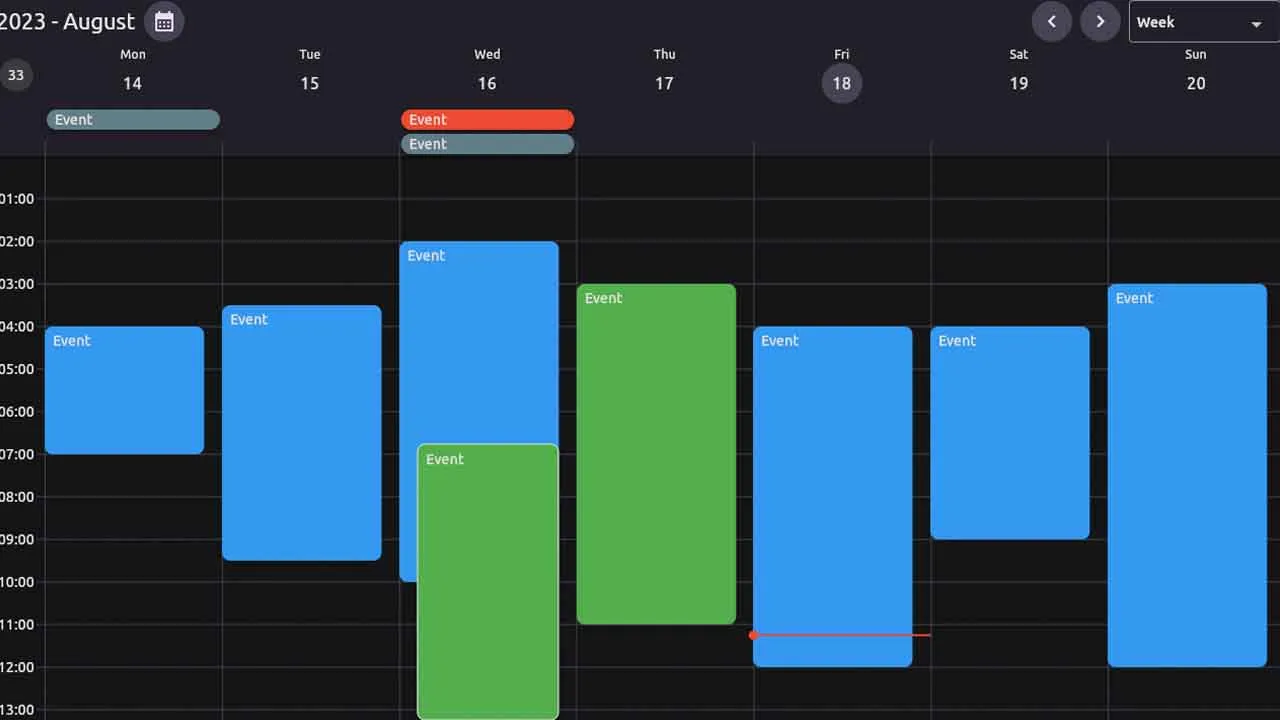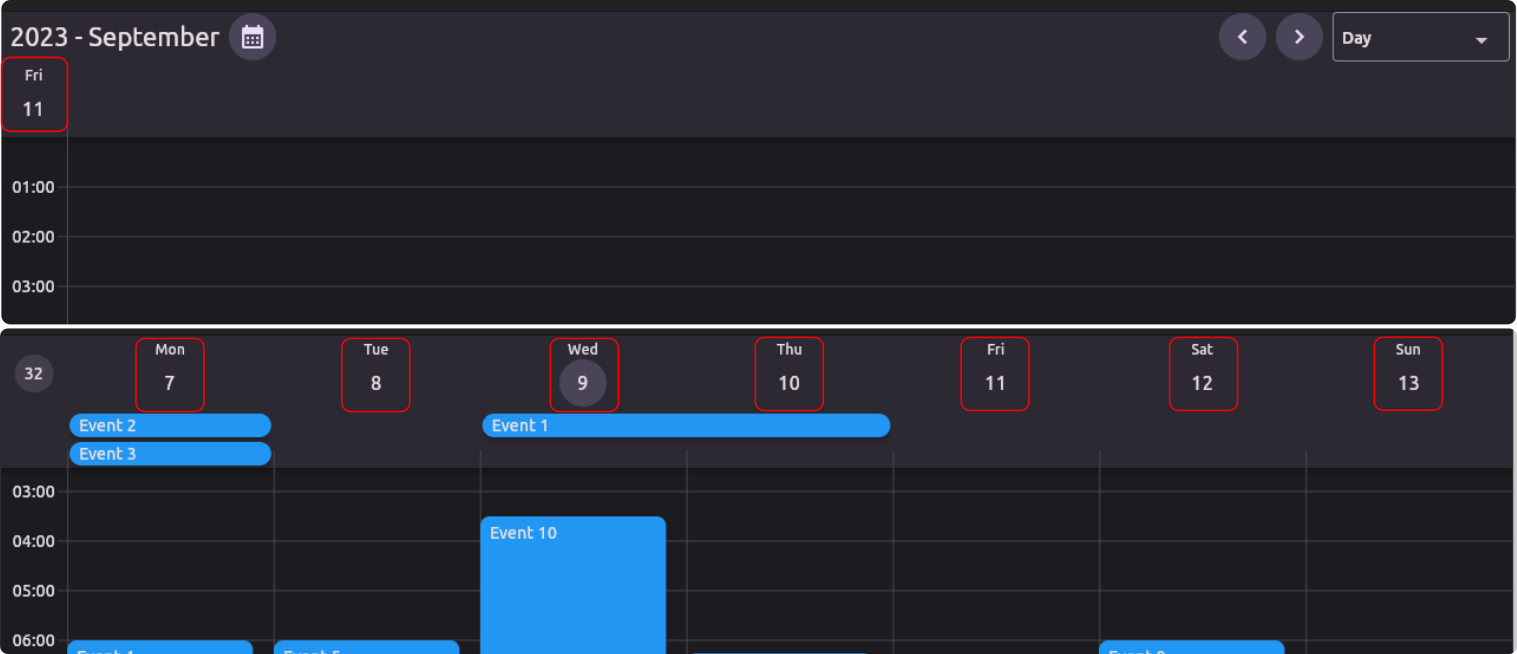Flutter package offers a Calendar Widget featuring integrated Day
This Flutter package offers a Calendar Widget featuring integrated Day, MultiDay, and Month views. Moreover, it empowers you to tailor the visual aspects of the calendar widget.
Web Example
Try it out here
Features

Mobile & Desktop - This package is compatible with mobile and desktop.
Calendar Views - There are 3 calendar views available, Day, MultiDay, and Month. Find out more
Reschedule - Drag and Drop events to your liking. Try it out
Resize - Resize events by dragging the edges of an event. Try it out
Event Handeling - When a there is interaction with a tile or component the event can be handeled by you. Find out more
Flexible View's - Each of the Calendar View's takes a ViewConfiguration, this has some parameters you can change, OR you can create your own. Find out more
Custom Object - CaledarEvent's can contain any object of your choosing. Find out more
Appearance - You can change the style of the calendar and default components. Find out more
Custom Builders - You can create your own builders for different components of the calendar. Find out more
Custom LayoutControllers - You can create your own algorithm to layout tiles. Find out more
Installation
Add this to your package's pubspec.yaml file:
$ flutter pub add kalender
Import it:
import 'package:kalender/kalender.dart';
Usage
Create a custom class to store your data.
class Event {
final String title;
final Color color;
Event(this.title, this.description);
}
Create a EventsController
final eventsController = EventsController<Event>();
Add events to the controller
eventsController.addEvent(
CalendarEvent(
dateTimeRange: DateTimeRange()
eventData: Event(
title: 'Event 1',
color: Colors.blue,
),
),
);
Create a CalendarController
final calendarController = CalendarController();
Create tile builders
Widget _tileBuilder(event, tileConfiguration) => Widget()
Widget _multiDayTileBuilder(event, tileConfiguration) => Widget()
Widget _monthEventTileBuilder(event, tileConfiguration) => Widget()
Create a CalendarView
CalendarView(
eventsController: eventsController,
calendarController: calendarController,
tileBuilder: _tileBuilder(),
multiDayTileBuilder: _multiDayTileBuilder(),
monthTileBuilder: _monthEventTileBuilder(),
)
Additional information
Calendar Views
There are a few constructors that you can choose from to create a CalendarView.
Default Constructor - this constructor will build the correct view (Day, MultiDay, Month) based on the ViewConfiguration you pass it.
DayView - this constructor will build a DayView and does not need the monthTileBuilder.
MultiDayView - this constructor will build a MultiDayView and does not need the monthTileBuilder.
MonthView - this constructor will build a MonthView and does not need the tileBuilder or multiDayTileBuilder.
View Configuration
The CaledarView takes a ViewConfiguration object.
There are 3 'Types' of ViewConfiguration's: DayViewConfiguration, MultiDayViewConfiguration, and MonthViewConfiguration.
- You can create a Custom ViewConfiguration by extending one of these 'Types'.
These are the default ViewConfiguration's:
DayConfiguration - This configuration is used to configure the SingleDayView.
DayConfiguration(
// The width of the timeline on the left of the page.
timelineWidth: 56,
// The overlap between the timeline and hourlines.
hourlineTimelineOverlap: 8,
// The height of the multi day tiles.
multidayTileHeight: 24,
// The size of one slot in the calendar.
slotSize: SlotSize(minutes: 15),
// Allow EventTiles to snap to each other.
eventSnapping: true,
// Allow EventTiles snap to the time indicator.
timeIndicatorSnapping: true,
// Allow the view to create new events.
createNewEvents: true,
// The duration of the vertical step while dragging.
verticalStepDuration: Duration(minutes: 15),
// The vertical snap range while dragging.
verticalSnapRange: Duration(minutes: 15),
),
MultiDayConfiguration - This configuration is used to configure the MultiDayView and can display any number of days.
MultiDayConfiguration(
name: 'Two Day',
numberOfDays: 2,
timelineWidth: 56,
hourlineTimelineOverlap: 8,
multidayTileHeight: 24,
slotSize: SlotSize(minutes: 15),
paintWeekNumber: true,
eventSnapping: true,
timeIndicatorSnapping: true,
createNewEvents: true,
verticalStepDuration: Duration(minutes: 15),
verticalSnapRange: Duration(minutes: 15),
),
WeekConfiguration - This configuration is used to configure the MultiDayView and displays 7 days that starts on the firstDayOfWeek.
WeekConfiguration(
timelineWidth: 56,
hourlineTimelineOverlap: 8,
multidayTileHeight: 24,
slotSize: SlotSize(minutes: 15),
paintWeekNumber: true,
eventSnapping: true,
timeIndicatorSnapping: true,
// The first day of the week.
firstDayOfWeek: DateTime.monday,
createNewEvents: true,
verticalStepDuration: Duration(minutes: 15),
verticalSnapRange: Duration(minutes: 15),
),
WorkWeekConfiguration - This configuration is used to configure the MultiDayView and displays 5 days that starts on monday.
WorkWeekConfiguration(
timelineWidth: 56,
hourlineTimelineOverlap: 8,
multidayTileHeight: 24,
slotSize: SlotSize(minutes: 15),
paintWeekNumber: true,
eventSnapping: true,
timeIndicatorSnapping: true,
createNewEvents: true,
verticalStepDuration: Duration(minutes: 15),
verticalSnapRange: Duration(minutes: 15),
)
MonthConfiguration - this configuration is used to configure the MonthView.
MonthConfiguration(
firstDayOfWeek: DateTime.monday,
// Can events be resized.
enableRezising: true,
createNewEvents: true,
)
Event Handling
The CaledarView can take a CalendarEventHandlers object. The CalendarEventHandlers handles the user's interaction with the calendar. (Do not confuse the CalendarEventHandlers with the EventsController)
There are 4 events at this time that can be handeled.
onEventChanged: this function is called when an event displayed on the calendar is changed. (resized or moved)
onEventTapped: this function is called when an event displayed on the calendar is tapped.
onCreateEvent: this function is called when a new event is created by the calendar.
onDateTapped: this function is called when a date on the calendar is tapped.
CalendarEventHandlers<Event>(
onEventChangeStart: (CalendarEvent<T> event) {
// This function is called when an event is about to be changed.
}
onEventChanged: (DateTimeRange initialDateTimeRange, CalendarEvent<Event> calendarEvent) async {
// The initialDateTimeRange is the original DateTimeRange of the event.
// The event is a reference to the event that was changed.
// This is a async function, so you can do any async work here.
// Once this function is complete the calendar will rebuild.
},
onEventTapped: (CalendarEvent<Event> calendarEvent) async {
// The calendarEvent is a reference to the event that was tapped.
// This is a async function, so you can do any async work here.
// Once this function is complete the calendar will rebuild.
},
onCreateEvent: (CalendarEvent<Event> calendarEvent) async {
// The calendarEvent is a empty event and is not yet added to the list of events.
// This is a async function, so you can do any async work here.
// If you want to add the event to the calendar
eventsController.addEvent(event);
// Once this function completes the calendar will rebuild.
},
onDateTapped: (date) {
// The date is the date that was tapped. see example for use case.
},
);
Events Controller
The CaledarView takes a EventsController object. The EventsController is used to store and manage CalendarEvent's. (Do not confuse the EventsController with EventHandling)
| Function | Parameters | Description |
|---|---|---|
| addEvent | CalendarEvent<T> event | Adds this event to the list and rebuilds the calendar view |
| addEvents | List<CalendarEvent<T>> events | Adds these events to the list and rebuilds the calendar view |
| removeEvent | CalendarEvent<T> event | Removes this event from the list and rebuilds the calendar view |
| removeWhere | bool Function(CalendarEvent<T> element) test | Removes the event(s) where the test returns true |
| clearEvents | Clears the list of stored events | |
| updateEvent | T? newEventData, DateTimeRange? newDateTimeRange,bool Function(CalendarEvent | Updates the eventData or newDateTimeRange (if provided), of the event where the test returns true |
Calendar Controller
The CaledarView takes a CalendarController object. The CalendarController is used to control the CalendarView.
| Function | Parameters | Description |
|---|---|---|
| animateToNextPage | Duration? duration, Curve? curve | Animates to the next page. |
| animateToPreviousPage | Duration? duration, Curve? curve | Animates to the previous page. |
| jumpToPage | int page | Jumps to the given page. |
| jumpToDate | DateTime date | Jumps to the given date. |
| animateToDate | DateTime date, {Duration? duration, Curve? curve,} | Animates to the DateTime provided. |
| adjustHeightPerMinute | double heightPerMinute | Changes the heightPerMinute of the view. |
| animateToEvent | CalendarEvent | Animates to the CalendarEvent. |
| lockScrollPhyscis | Locks the vertical scroll of the current view. | |
| unlockScrollPhysics | ScrollPhysics? scrollPhysics | Unlocks the vertical scroll of the current view. |
Custom Object
The CalendarEvent can contain any object. This object can be accessed by the tileBuilders and the CalendarEventHandlers.
Custom Object Example:
CalendarEvent<Event>(
dateTimeRange: DateTimeRange(),
eventData: Event(
title: 'Event 1',
color: Colors.blue,
),
);
Tile Builder Example:
Widget _tileBuilder(CalendarEvent<Event> event, tileConfiguration) {
final customObject = event.eventData;
return Card(
color: customObject.color,
child: Text(customObject.title),
);
}
LayoutControllers
There are three types of layout controllers: DayLayoutController, MultiDayLayoutController, and MonthLayoutController.
(See the example app for examples)
DayLayoutController Create your own DayLayoutController by extending the DayLayoutController class.
class DefaultDayLayoutController<T> extends DayTileLayoutController<T> {}
MultiDayLayoutController Create your own MultiDayLayoutController by extending the DayLayoutController class.
class DefaultMultidayLayoutController<T> extends MultiDayTileLayoutController<T> {}
MonthLayoutController Create your own MonthLayoutController by extending the DayLayoutController class.
class DefaultMultidayLayoutController<T> extends MultiDayTileLayoutController<T> {}
Appearance
The CalendarView consists of quite a few sub components: Each of these components can be customized in the CalendarStyle object or by passing a custom widget builder through the CalendarComponents object.
CalendarHeader - This is a custom widget that you can pass to the calendar to render in the header of the calendar.
(CalendarHeader)
DayHeader - This widget is displayed above a day colum in the calendar.
(DayHeader)
WeekNumber - This widget displays the week number of the year.
(WeekNumber)
DaySeprator - This widget is displayed between days in the calendar.
(DaySeprator)
Hourlines - This widget is displayes the hourlines in the calendar.
(Hourlines)
Timeline - This widget is displayed on the left side of the calendar to show the time.
(Timeline)
TimeIndicator - This widget is displayed on the current day to show the current time.
(TimeIndicator)
MonthHeader - This widget is displayed above the month grid in the calendar header.
(MonthHeader)
MonthCellHeader - This widget is displayed in a month cell in the month grid.
(MonthCellHeader)
MonthGrid - This widget is displayed in the month view to show the grid.
(MonthGrid)
Use this package as a library
Depend on it
Run this command:
With Flutter:
$ flutter pub add kalenderThis will add a line like this to your package's pubspec.yaml (and run an implicit flutter pub get):
dependencies:
kalender: ^0.0.7Alternatively, your editor might support flutter pub get. Check the docs for your editor to learn more.
Import it
Now in your Dart code, you can use:
import 'package:kalender/kalender.dart' import 'dart:io';
import 'package:example/functions/generate_calendar_eventsd.dart';
import 'package:example/models/event.dart';
import 'package:example/screens/desktop_screen.dart';
import 'package:example/screens/mobile_screen.dart';
import 'package:example/theme.dart';
import 'package:flutter/foundation.dart';
import 'package:flutter/material.dart';
import 'package:kalender/kalender.dart';
void main() {
runApp(const MyApp());
}
class MyApp extends StatefulWidget {
const MyApp({super.key});
static MyAppState? of(BuildContext context) =>
context.findAncestorStateOfType<MyAppState>();
@override
State<MyApp> createState() => MyAppState();
}
class MyAppState extends State<MyApp> {
ThemeMode themeMode = ThemeMode.dark;
@override
Widget build(BuildContext context) {
return MaterialApp(
debugShowCheckedModeBanner: false,
title: 'Flutter Demo',
theme: ThemeData(
useMaterial3: true,
colorScheme: lightColorScheme,
),
darkTheme: ThemeData(
useMaterial3: true,
colorScheme: darkColorScheme,
),
themeMode: themeMode,
home: MyHomePage(
toggleTheme: toggleTheme,
),
);
}
void toggleTheme() {
setState(() {
themeMode =
themeMode == ThemeMode.dark ? ThemeMode.light : ThemeMode.dark;
});
}
}
class MyHomePage extends StatefulWidget {
const MyHomePage({
super.key,
required this.toggleTheme,
});
final void Function() toggleTheme;
@override
State<MyHomePage> createState() => _MyHomePageState();
}
class _MyHomePageState extends State<MyHomePage> {
late final CalendarEventsController<Event> eventController;
@override
void initState() {
super.initState();
eventController = CalendarEventsController<Event>();
eventController.addEvents(generateCalendarEvents());
}
@override
Widget build(BuildContext context) {
return Scaffold(
body: Builder(
builder: (context) {
if (kIsWeb || !(Platform.isAndroid || Platform.isIOS)) {
return DesktopScreen(
eventsController: eventController,
viewConfigurations: viewConfigurations,
);
} else {
return MobileScreen(
eventsController: eventController,
viewConfigurations: viewConfigurations,
);
}
},
),
);
}
/// The list of view configurations that can be used.
List<ViewConfiguration> viewConfigurations = [
const DayConfiguration(
eventSnapping: true,
timeIndicatorSnapping: true,
),
const WeekConfiguration(
eventSnapping: true,
timeIndicatorSnapping: true,
),
const WorkWeekConfiguration(
eventSnapping: true,
timeIndicatorSnapping: true,
),
const MultiDayConfiguration(
name: 'Two Day',
numberOfDays: 2,
eventSnapping: true,
timeIndicatorSnapping: true,
),
const MultiDayConfiguration(
name: 'Three Day',
numberOfDays: 3,
eventSnapping: true,
timeIndicatorSnapping: true,
),
const MultiDayConfiguration(
name: 'Four Day',
numberOfDays: 4,
eventSnapping: true,
timeIndicatorSnapping: true,
),
const MonthConfiguration(
enableRezising: true,
),
];
} Download details:
Author: werner-scholtz
Source: https://github.com/werner-scholtz/kalender
#flutter #Calendar #Widget










